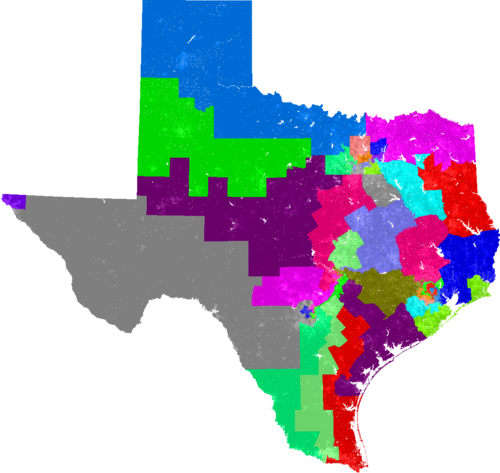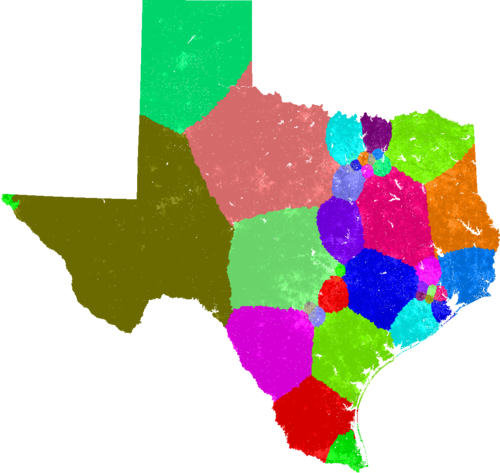America is a mess politically, and while it's easy to throw accusations about one side or the other being idiots, it's not quite that simple. All people are a product of what are their motivating factors and if you can look at those factors honestly then you'll usually have a good idea of what they're going to do. So the question becomes, if America in such terrible political shape, then what's causing the problem?
As with all complex things there's not a single answer to the question, but I do think there are some fundamental pieces that will help to get us back on track. And here are what I would argue should be the Top 5.
- Geographical/mathematical districting
- Changing the way we do primaries (and polling)
- If you can't vote in an election, you can't fund candidates/parties in that election
- Remap the Senate to be based on party-affiliation at a national level
- Eliminate corporate person-hood
1. Geographical/mathematical districting
Quite simply the way we do districting in the USA is disgusting. The party in charge does what it can to snub the party not-in-charge and then creates wide majorities that are well beyond the disparity seen on the ground.
I live in the State of Texas and what they did here in 2000 was pretty disgusting. Basically every city with a democratic core (which most communities have when forced to live in closer proximity to others) and fractured that core into a myriad of long snaking districts. A classic example can be seen here.

And it didn't get any better in 2012 when things split the City of Austin into not 3 districts but 5.

And what this map fails to show is those districts extend from South of San Antonio to Fort Worth. From West Texas to the suburbs of Houston. It's really disgusting and a blatant attempt to make sure that the city is not represented appropriately.
Under the current system though things won't get any better. In 20 years Hispanics will be the main population force, things will swing to the Democrats and then a similar outrage will happen but just in the other direction.
So how do you fix it?
Simple. You don't let parties control districting, and you instead let things be decided mathematically or geographically to create the cleanest most cohesive districts possible.
What does that look like? It's a thing of beauty, I'd like to show 2 possible methods:
Mathematical - via bdistricting.com
Create mathematically optimally-compact districts based on using census 'blocks' and finding a way that makes everybody as mathematically close as possible to the center of their district as possible.
It ends up being pretty elegant and turns the current map with it's long sweeping rural districts with tight urban curls:

Into this with its very cohesive districts:


Notice you now have simple circles/blocks that are very very easy to decipher and actually seem to line up very well with the geographical regions too.
Clean, elegant, and no possibility of bias.
Geographically (aka Shortest Split-Line) - via rangevoting.org
While not as elegant in final form, this method is very simple to implement and I think non-nerd voters would find lines less confusing.*
Here's what Texas would look like:

*And then they'd be instantaneously re-confused by the fact that you can't actually have 'lines' on a globe. You instead have arcs.
Changing the way we do primaries (and polling)
Primaries encourage one thing and one thing only. Getting the most fringe candidate from your party to march forth into a general election. And if you're in a non-competitive state/district, then that just marches further down the path of divisiveness. And our representatives are divisive, more now than almost ever before as researched by xkcd:
So how do you fix it?
You change the way that primaries and general elections are held.
...and if you want to do it really well, you change the way we vote.
If primaries serve to get the staunchest fringe people to move forward, then we have to have a better way of calibrating things a bit closer towards the middle. And the simplest way to do that is via an open primary. Everybody can vote for anybody. And then the top two finishers will go into a head-to-head competition in the fall.
This could also prove really interesting in places like Wyoming or Rhode Island where winning a minority party primary literally only will ever mean that you're the first loser. So let's just dump that sort of charade and do what primaries are meant to do and limit an array of candidates down to just two.
Note: One place of interest to watch in the near future is California. They recently changed the way they do districting (not perfect, but better than the old way) and made all primaries open. As a result California has seen one of the most positive political climates that they've ever had and is already swinging from being a mockery of ineptness to being a model to strive for. - NY Times Article about it
Also...
The way we vote in the USA is stupid. It's just terrible. Sure it sounds nice to say that 'the person with the most votes wins', but that's not really the case. Instead we end up with this terrible game-theory that ends up only ever giving us two choices that aren't really what any of us wanted in the first place.
The best way I've ever seen it explained is here:
Actually, check out all of CGP Grey's videos, they're informative and fun.
So what we really need is a better voting system.
And fortunately there are many better alternatives to what we have now.
My personal favorites are ones that ensure a Condorcet Winner. Which is a fancy way of saying, "Ones that make sure whoever won is actually somebody that most people are relatively happy about compared to the other options."
But really anything that doesn't keep us locked into a two party system is key.
There's many different ways of doing this you can:
- Have a list of head-to-head competitions and simply select which you like more in each matchup - Ranked-pairs Voting
- Rank each candidate by how much you like them on a scale of 1-10 - Schulze
- Have a list of candidates and simply put a check on ones you'd be ok with - Approval Voting
- Rank candidates in order that you'd like to see them win - Alternative Vote / Instant-runoff Voting
As a personal note, we recently used Ranked-pairs to hold voting on cycling jersey designs on an online forum that I'm a part of and the results were really really great. While the winner wasn't everybody's favorite, the plurality were very happy and even those that weren't agreed that the system seemed to work very well and very simply.
If we can get a better method of voting, then I think we can finally see an expansion of multiple parties within the USA, which is I think one of they key elements to helping to reduce the 'us' vs 'them' mentality that seems to be growing and allow for some newer and fresher (or older and staler) ideas to flourish.
If you can't vote in an election, you can't fund candidates/parties in that election
This one's more of a pet-peeve and I don't have a lot of data (yet) to back it up. But I'm really sickened by the fact that we continually allow people from outside of a district to try and influence elections that they have no part of.
This happens on both sides of the aisle too, and I think to a detriment of all involved because it ends up turning local/regional elections into pithy soundbites and makes the race lose humanity too. There's actually a really great This American Life episode (509: It Says So Right Here - Act III) about how huge amounts of outside cash overturned little elections and ended up embittering many people in the area, but only really because of outside interests.
While I can understand some of the concerns for things that one district can do that directly and adversely effects another district (like building a polution factory upwind of anothe district). Most issues that money pours in for are actually more-local decisions than we'd like to admit. Things like gun rights...the importance of those and in which direction really depends on where you are. If you're in Montana, then I can see why you'd want to have a gun on your person. If you're in a major downtown I can see a lot of reasons why you really don't want every person 2 ft from you having a gun on them. But instead national lobbies taint the local rationale and we end up in a more divisive place that is less effective at creating the policies people need and want.
....and you know who else can't vote?
Corporations. And since they can't vote, I would love to see that they can't fund elections at all in any way shape or form. I think that would go a long way towards decreasing the money we see in politics which could increase civility and better level the playing field that those large corporations are constantly seeking to tilt.
Remap the Senate to be based on party-affiliation at a national level
Giving states like Montana or Rhode Island just as much of a say in politics at a national level as those from a state like California or Texas or Florida is just ridiculous. I don't care how you slice it, the USA of today is not a small colonial gathering; we're a huge country now. And we need better ways to make sure that when a district is split 55/45 that the voice of the 45 is not perpetually ignored (in Texas we're about 57/43, but nationally over 85% of our representatives are from the 57 side. That means if you're in the 57, your vote counts as 1.5 votes, and if you're in the 43 your vote counts as 0.3 votes...that's not right)
Giving states like Montana or Rhode Island just as much of a say in politics at a national level as those from a state like California or Texas or Florida is just ridiculous. I don't care how you slice it, the USA of today is not a small colonial gathering; we're a huge country now. And we need better ways to make sure that when a district is split 55/45 that the voice of the 45 is not perpetually ignored (in Texas we're about 57/43, but nationally over 85% of our representatives are from the 57 side. That means if you're in the 57, your vote counts as 1.5 votes, and if you're in the 43 your vote counts as 0.3 votes...that's not right)
Instead we should disband the entire senate as it stands now and just allow people to vote on party representatives that are chosen by their party. That means we'll finally get more nuance in the political discussion. Parties like the Libertarians (which should make up about 14% of the electorate, but actually are ~0% of representatives) can finally flourish. Those passionate Green-party people could finally have somebody standing up for the environment. And who knows what else would emerge from the mix. Also very important is that no party could unilaterally move forward with a terrible idea. You'd have to get people that see very differently than you to go in with you on something, and it would prevent a lot of the current stalemate situations that we're plagued with in the modern congressional era.
Eliminate corporate person-hood
Corporations are composed of people but should not be given the rights of people. Period.
Corporations are composed of people but should not be given the rights of people. Period.
I think this one's really simple and the only people confused about it are 5 Supreme Court justices who hid behind doublespeak-interpreted-legality to make a very amoral decision (that likely lined their pockets quite well).
OK, that's it for this political post. Hopefully nothing too partisan one way or the other. I was trying to keep a relatively balanced perspective on things and address root-causes, not current effects. I think the USA has a great thing going for us overall, but I think we're too easily pulled one way or another by being laden with a system that encourages two highly-polarized parties that try to turn the world into one of blacks and whites, when in reality we live in a world of wonderful shades between those two extremes. And those ebbing and flowing contrasts can make a rich portrait if only we give them the chance.



1 comment:
Interesting way to mathematically do quick mapping with unusual shapes:
http://bl.ocks.org/mbostock/4060366
Post a Comment